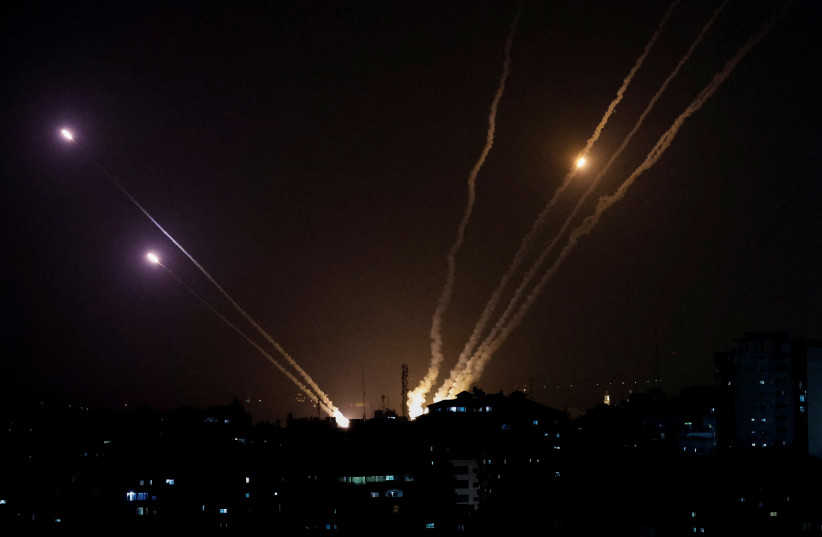Operation Shield and Arrow, which ended after five days on Saturday, was the latest in a series of IDF operations targeting terrorists in the Gaza Strip, this time directed at the Iranian-funded Palestinian Islamic Jihad rather than Hamas, which rules the territory. In all probability, it won’t be the last.
Following every operation, the terrorist groups in Gaza lick their wounds, replace commanders knocked out in targeted strikes with new ones and, with the aid of Iran and others, rearm themselves with more rockets and missiles, some with better capabilities and longer ranges.
Each round sees a tit-for-tat escalation that ends with a fragile ceasefire – this time, mediated by Egypt – that can be broken at any time. With Jerusalem Day approaching on Thursday, security forces will again be on the alert for a resumption of rocket attacks from Gaza.
Break the cycle
As Jerusalem Post Editor-in-Chief Avi Mayer wrote on Friday, it is time to break the cycle. “Israel has stated its desire to dramatically improve the lives of the people of Gaza,” he noted. “All it asks in return is a sustained period of calm and an end to attacks targeting Israelis.”
Mayer pointed out that a host of international actors – from Egypt to Turkey to Qatar and others – exert leverage over Hamas and have exercised it at various points, including to end previous rounds of warfare.

“The combination of internal and external pressures, if carefully and calculatedly applied, may well force Hamas to begrudgingly consider a rehabilitation scheme for Gaza that would see the territory’s overall situation dramatically enhanced in exchange for a protracted cessation of hostilities,” he wrote. “The ball is in Hamas’s court and there are those who can force the group to pick it up.”
One of these is the United Nations, which has not made any genuine attempt to change this untenable situation. Much to the contrary. It frequently draws an unfair moral equivalence between Israel and terrorist organizations.
For example, when UN Special Coordinator for the Middle East Peace Process Tor Wennesland welcomed the announcement of a ceasefire, he issued a statement saying, “I am deeply saddened by the loss of life and injuries, including children and women, from Israeli airstrikes in Gaza and the indiscriminate firing of rockets toward Israel by Palestinian Islamic Jihad and other militant groups. Deepest condolences to the families of the victims of the violence and their loved ones.”
Wennesland said he looked forward to the immediate restoration of humanitarian access and all social and economic measures to support Palestinian livelihoods in Gaza. To this end, Israel reopened the Kerem Shalom and Erez crossings on the Israel-Gaza border on Sunday.
Instead of focusing its attention on international debates on Gaza and resolutions condemning Israel, what the UN should be doing is formulating and investing in a long-term plan to rehabilitate Gaza and disarm the terrorist groups there.
Support doesn't reach Gaza's people
As a study written by the Jerusalem Center for Public Affairs found, “There is no question that people living in Gaza suffer constant hardships and deprivations. Their conditions, though, are the fault of Hamas rather than Israel. The international community, including Israel, provides billions of dollars of support to the Palestinians each year, little of which reaches the hands of its intended recipients."
“Instead Hamas uses the money and supplies to further its ‘struggle.’ It then portrays the people that it oppresses as victims of Israel’s malevolence in order to gain sympathy and further pecuniary assistance.”
Under the rule of Hamas, which wrested control from the Palestinian Authority in 2007 following Israel’s Disengagement in 2005, the Gaza Strip – often described as one of the most impoverished and densely populated areas in the world – represents a clear and difficult challenge for the UN.
It could start by calling a regional conference on Gaza attended by all the legitimate parties that have an interest in rehabilitating the Strip, including Egypt, the Palestinian Authority, Qatar and Israel.
In the meantime, the message to Hamas, PIJ and other terrorist groups in Gaza is simple: no more rocket attacks against Israel will be tolerated. Or, in the words of National Security Adviser Tzachi Hanegbi, “Quiet will be met with quiet.”
